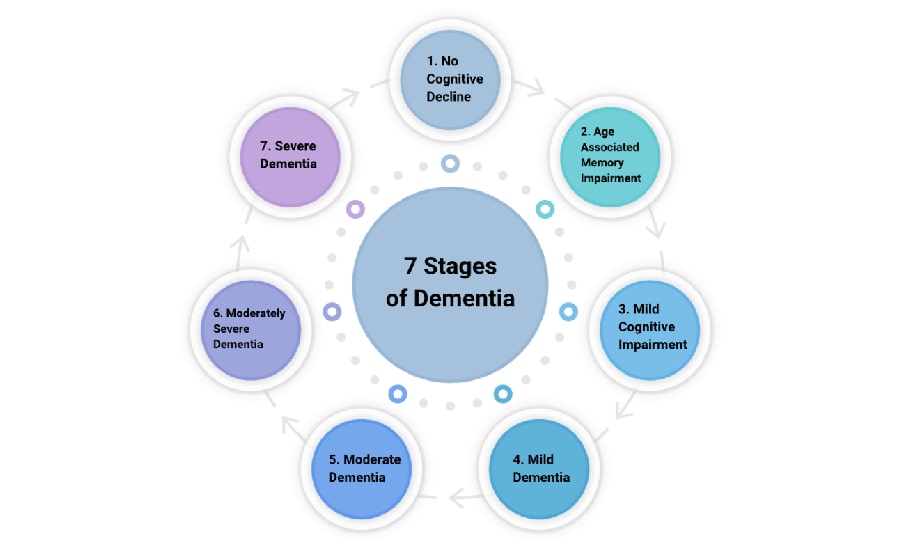Lewy Body Dementia (LBD) is a type of brain disease that affects how a person thinks, feels, and behaves. It can be really confusing, especially when we talk about its stages. Understanding the 7 stages of Lewy Body Dementia can help families and friends support their loved ones better. In this article, we’ll explore what Lewy Body Dementia is, break down each of the seven stages, discuss the symptoms and treatments, and talk about how to cope with this challenging condition.
What is Lewy Body Dementia?
First, let’s understand what Lewy Body Dementia is. It occurs when tiny protein clumps, called Lewy bodies, build up in the brain. These clumps can cause problems with thinking, movement, and mood. Imagine a computer that has a lot of viruses; it starts to slow down and can’t do what it’s supposed to. This is similar to what happens in the brain with Lewy Body Dementia.
People with LBD may experience a mix of symptoms similar to Alzheimer’s disease and Parkinson’s disease. This can include memory problems, difficulties with movement, and even mood swings. It’s like a puzzle that can be hard to solve, but knowing the stages can make it easier to understand.
The 7 Stages of Lewy Body Dementia
Stage 1: No Symptoms
In the first stage, a person doesn’t show any symptoms. They might feel completely normal and go about their daily life without any changes. This stage can last for a long time, sometimes for years. It’s important to note that just because someone is in this stage doesn’t mean they are free from the disease. It’s like having a hidden secret that hasn’t revealed itself yet.
Stage 2: Mild Symptoms
In the second stage, some mild symptoms may start to appear. People might forget things more often or feel a little confused. They may have trouble with focus or pay less attention to what’s happening around them. Family and friends might notice these small changes, but they aren’t usually very serious. It’s a time when the person may not even realize something is wrong, but those close to them might start to worry.
Stage 3: Moderate Symptoms
As we move to the third stage, the symptoms become more noticeable. This is when people with Lewy Body Dementia may struggle with tasks they once found easy. They might have trouble with their memory, like forgetting names or where they put things. Some might also experience changes in sleep patterns, such as sleeping too much or having trouble falling asleep. This can be frustrating, both for the individual and their family, as the changes can start to interfere with daily life.
Stage 4: Significant Cognitive Decline
In the fourth stage, cognitive decline is more significant. This means thinking skills continue to get worse. The person may become confused about where they are or who their family members are. They may also experience visual hallucinations, where they see things that aren’t there. This can be very scary for them and their loved ones. It’s like being in a dream where everything feels real, but it’s not. Family members may need to reassure and comfort their loved ones as they navigate this challenging time.
Stage 5: Severe Cognitive Decline
By the fifth stage, the symptoms can be very severe. The person may need help with daily activities like eating, bathing, or getting dressed. They might not remember their own name or recognize family members. This can be a difficult time for everyone involved, as the individual requires more care and support. Family members might feel overwhelmed, and it’s important to remember that asking for help is okay.
Stage 6: Very Severe Cognitive Decline
In the sixth stage, the decline continues, and people often lose the ability to communicate clearly. They might only be able to say a few words or may not speak at all. It can be heartbreaking for family members to see their loved one in this stage. They often need round-the-clock care, as they might forget how to do basic things like eat or walk. Caregivers may find this stage particularly challenging, as they need to provide not just physical care but emotional support as well.
Stage 7: The Final Days
Finally, in the seventh stage, which we can think of as the lewy body dementia final days, the person may become unresponsive and need complete care. They may sleep a lot and show little awareness of their surroundings. At this stage, many people with Lewy Body Dementia pass away, often due to complications related to the disease. It’s important for family and friends to provide comfort and love during this time. This can be a very emotional period, and many caregivers may need support themselves to cope with their feelings of loss and sadness.
7 Stages of Lewy Body Dementia Symptoms
Understanding the 7 stages of Lewy Body Dementia symptoms can help everyone involved. Symptoms can vary from person to person, but here are some common ones for each stage:
- No Symptoms: Everything seems normal.
- Mild Symptoms: Forgetfulness and slight confusion.
- Moderate Symptoms: More noticeable memory problems and sleep issues.
- Significant Cognitive Decline: Confusion, hallucinations, and difficulty with daily tasks.
- Severe Cognitive Decline: Major memory loss and needing help with basic activities.
- Very Severe Cognitive Decline: Trouble communicating and needing constant care.
- Final Days: Sleeping a lot and becoming unresponsive.
Each person may experience these stages differently, and some might move through the stages more quickly than others. It’s important to remember that everyone’s journey with Lewy Body Dementia is unique.
7 Stages of Lewy Body Dementia Treatment
Now, let’s talk about the 7 stages of Lewy Body Dementia treatment. There isn’t a cure for LBD, but there are ways to manage the symptoms and help improve quality of life.
- Stage 1: There usually isn’t any treatment needed since there are no symptoms.
- Stage 2: Simple lifestyle changes, like staying active and mentally engaged, can be helpful.
- Stage 3: Doctors may suggest cognitive therapy to help with memory.
- Stage 4: Medications may be prescribed to manage hallucinations and confusion.
- Stage 5: More intensive care and possibly additional medications to help with behavior.
- Stage 6: Professional caregiving support becomes essential, along with medication management.
- Stage 7: Palliative care focuses on comfort and quality of life in the final days.
Each stage may require different types of care, and it’s important for family members to work with healthcare providers to find the best approach for their loved ones.
Coping with Lewy Body Dementia
Coping with Lewy Body Dementia can be challenging for both the person with the disease and their loved ones. Here are some tips that might help:
- Educate Yourself: Learn as much as you can about Lewy Body Dementia. Understanding what’s happening can reduce fear and anxiety.
- Stay Patient: It’s important to be patient with your loved one. They are not doing this on purpose; their brain is simply not functioning the way it used to.
- Seek Support: Don’t hesitate to reach out for help. Support groups can connect you with others who are going through similar experiences.
- Create a Routine: Having a daily routine can provide comfort and predictability for someone with LBD.
- Focus on the Positive: Try to cherish the good moments. Engage in activities that your loved one enjoys, as this can enhance their mood and well-being.
Conclusion
Understanding the 7 stages of Lewy Body Dementia helps families and friends support their loved ones better. Each stage has its own challenges, but knowing what to expect can make a big difference. By recognizing symptoms and seeking appropriate treatment, everyone involved can find ways to cope and make the journey a little easier. Remember, it’s always important to reach out for help from doctors and support groups when dealing with Lewy Body Dementia. You’re not alone on this journey!

